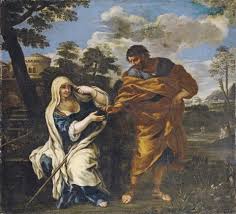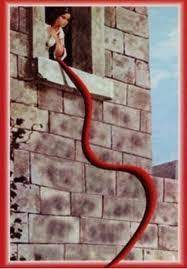The Legacy of Perez
Origin: Hebrew. Meaning: Breach, burst forth, breakthrough.
Perez is a beautiful boy's name of Hebrew origin,
meaning “breach,” “burst forth,” or “breakthrough.”
The name Perez is quite prominent in the Christian Bible, too,
and is borne by a figure famed as one of the many sons of Judah.
(Hebrew: פֶּרֶץ / פָּרֶץ, Modern Pereṣ / Pareṣ Tiberian Péreṣ / Pāreṣ),

Commentary by Thomas Constable
Judah and TamarGenesis 38 This chapter seems at first out of place since it interrupts the story of Joseph, but we must remember that this is the toledot of Jacob. This is the story of what happened to his whole family, not just Joseph. The central problem with which the chapter deals is childlessness. The events of the chapter must span at least 20 years, years during which Joseph was lost to his family. These are the records of the generations of Jacob. Joseph, when seventeen years of age, was pasturing the flock with his brothers while he was still a youth, along with the sons of Bilhah and the sons of Zilpah, his father's wives. And Joseph brought back a bad report about them to their father. (Genesis 37:2.) Now Joseph was thirty years old when he stood before Pharaoh, king of Egypt. And Joseph went out from the presence of Pharaoh and went through all the land of Egypt. During the seven years of plenty the land brought forth abundantly. Genesis 41:46-47; Genesis 45:6 (NAS) "For the famine has been in the land these two years, and there are still five years in which there will be neither plowing nor harvesting." (Genesis 45:6). Judah tried unsuccessfully to ensure the Levirite rights of his daughter-in-law Tamar. As a last resort Tamar deceived him into having sexual intercourse with her by masquerading as a prostitute. She thereby maintained her right to become the mother of Judah’s children, the younger of which displaced his older twin in an unusual birth. The following sketch from the life of Judah is intended to point out the origin of the three leading families of the future princely tribe in Israel [Shelah, Perez, and Zerah] and at the same time to show in what danger the sons of Jacob would have been of forgetting the sacred vocation of their race, through marriages with Canaanitish women, and of perishing in the sin of Canaan, if the mercy of God had not interposed, and by leading Joseph into Egypt prepared the way for the removal of the whole house of Jacob into that land, and thus protected the family, just as it was expanding into a nation, from the corrupting influence of the manners and customs of Canaan. This chapter records the compromise of the Israelites, specifically Judah, with the Canaanites, Shua and Tamar, that resulted in the confusion of seed, the chosen with the condemned. This is the first time one of the chosen seed selected a wife outside the preferred families of the patriarchs. Like Esau, Judah chose a wife from the women of the land, even one of the cursed Canaanites (cf. Genesis 24:3-4; Genesis 27:46 to Genesis 28:2). It is perhaps the basis for the prohibition against mixing various kinds of seed, yoking two different kinds of animals together, weaving two kinds of thread into cloth, etc., in the Mosaic Law. "One gets the distinct impression that ever since the Dinah incident (ch. 34) Jacob has less and less control over the behavior of his family." Levirite marriage (the marriage of a man to his deceased brother’s wife to provide his brother with an heir) was a common custom in the ancient Near East at this time Then Judah said to Onan, 'Go in to your brother's wife, and perform your duty as a brother-in-law to her, and raise up offspring for your brother.' Onan knew that the offspring would not be his; so when he went in to his brother's wife, he wasted his seed on the ground in order not to give offspring to his brother. But what he did was displeasing in the sight of the Lord; so He took his life also. (Genesis 38:8-10). It was common also in Asia, Africa, and other areas, but it evidently originated in Mesopotamia. The Mosaic Law did not abolish it but restricted it in Israel to preserve the sanctity of marriage (cf. 'When brothers live together and one of them dies and has no son, the wife of the deceased shall not be married outside the family to a strange man. Her husband's brother shall go in to her and take her to himself as wife and perform the duty of a husband's brother to her. It shall be that the firstborn whom she bears shall assume the name of his dead brother, so that his name will not be blotted out from Israel. But if the man does not desire to take his brother's wife, then his brother's wife shall go up to the gate to the elders and say, ‘My husband's brother refuses to establish a name for his brother in Israel; he is not willing to perform the duty of a husband's brother to me.' Then the elders of his city shall summon him and speak to him. And if he persists and says, ‘I do not desire to take her,' then his brother's wife shall come to him in the sight of the elders, and pull his sandal off his foot and spit in his face; and she shall declare, ‘Thus it is done to the man who does not build up his brother's house.'In Israel his name shall be called, ‘The house of him whose sandal is removed.') (Deuteronomy 25:5-10). "The enormity of Onan’s sin is in its studied outrage against the family, against his brother’s widow and against his own body. The standard English versions fail to make clear that this was his persistent practice. When (v9) should be translated ’whenever.’" Onan’s refusal to give Tamar a child not only demonstrated a lack of love for his deceased brother. It also revealed Onan’s selfish heart that wanted for himself what would have gone to his elder brother’s heir. If Tamar had borne him a son, that child would have been the perpetuator of Er’s name as well as that of Onan (cf. Then Boaz said, 'On the day you buy the field from the hand of Naomi, you must also acquire Ruth the Moabitess, the widow of the deceased, in order to raise up the name of the deceased on his inheritance.' Ruth 4:5; Ruth 4:21-22). God judged Onan’s sin severely because descendants were important in His plans for the Israelite patriarchs. Onan was frustrating the fulfillment of God’s promises to Abraham, Isaac, and Jacob (cf. Genesis 11:4 (NAS) Judah sinned against Tamar by forcing her to live as a widow (Genesis 38:11) Judah comes across at the beginning of this incident again as a hard and callous man. He had previously suggested selling Joseph into slavery to make money from him and deceiving Jacob despite Reuben’s protests (Judah said to his brothers, 'What profit is it for us to kill our brother and cover up his blood? 27 Come and let us sell him to the Ishmaelites and not lay our hands on him, for he is our brother, our own flesh.' And his brothers listened to him. (Genesis 37:26-27; 29) Now Reuben returned to the pit, and behold, Joseph was not in the pit; so he tore his garments. 30 He returned to his brothers and said, 'The boy is not there; as for me, where am I to go?' (Genesis 37:29-30). Now the writer portrayed him as showing no grief over the deaths of his sons, in contrast to Jacob who mourned inconsolably over Joseph’s apparent death (Genesis 37:34-35) Verses 12-30When Judah deceived Jacob. 31 So they took Joseph's tunic, and slaughtered a male goat and dipped the tunic in the blood; 32 and they sent the varicolored tunic and brought it to their father and said, 'We found this; please examine it to see whether it is your son's tunic or not.' "Tamar qualifies as a heroine in the story, for she risked everything for her right to be the mother in the family of Judah and to protect the family." "Although Tamar’s actions in this regard may seem strange to us, there is evidence that among ancient Assyrian and Hittite peoples, part of the custom was that the levirite responsibility could pass to the father of the widow’s husband if there were no brothers to fulfill it. Thus Tamar was only trying to acquire that to which she had a legal right." Moses did not clarify her motivation. Whether or not she understood and believed the promises to the patriarchs regarding their sacred vocation, she did become an ancestor of the Messiah (Ruth 4:18-22) 18 Now these are the generations of Perez: to Perez was born Hezron, 19 and to Hezron was born Ram, and to Ram, Amminadab, 20 and to Amminadab was born Nahshon, and to Nahshon, Salmon, 21 and to Salmon was born Boaz, and to Boaz, Obed, 22 and to Obed was born Jesse, and to Jesse, David. "Just as in chapter 20 where the seed of Abraham was protected by the ’righteous’ (saddiq, Genesis 20:4 (NAS)4 Now Abimelech had not come near her; and he said, 'Lord, will You slay a nation, even though blameless? "The scene marks the beginning of Judah’s transformation when he declares of Tamar, ’She is righteous, not I’ (lit., Genesis 38:26) "...in its biographical sketches, character change is what Genesis is all about: Abram becomes Abraham; Jacob becomes Israel. Particularly in Jacob’s family we see examples of character change: Reuben, violator of his father’s concubine, later shows great concern for both Joseph and his father, while the upstart cocky Joseph becomes the wise statesman who forgives his brothers. Thus, this chapter has a most important role in clarifying the course of the subsequent narrative; without it we should find its development inexplicable." Perez (meaning a breach, or one who breaks through) was the first of the twins born (27 It came about at the time she was giving birth, that behold, there were twins in her womb. 28 Moreover, it took place while she was giving birth, one put out a hand, and the midwife took and tied a scarlet thread on his hand, saying, 'This one came out first.' 29 But it came about as he drew back his hand, that behold, his brother came out. Then she said, 'What a breach you have made for yourself!' So he was named Perez. 30 Afterward his brother came out who had the scarlet thread on his hand; and he was named Zerah. (Genesis 38:27-30). "He [Judah] and his brothers sold their younger brother into Egypt, thinking they could thwart God’s design that the elder brothers would serve the younger Joseph. Yet in Judah’s own family, despite his attempts to hinder Tamar’s marriage, God’s will worked out in a poignant confirmation of the principle that the elder would serve the younger." The scarlet thread marked the second-born, Zerah (dawning, i.e., red or scarlet). It did not indicate the Messianic line. That line came through the other son, Perez. The thread is perhaps just a detail of the story that explains the names given. "A key to this story is the remarkable similarity between the births of Perez and Zerah and of Jacob and Esau. Both births involve twins; in both the younger thrusts ahead of the elder and displaces him; and in both the one who is naturally expected to get the birthright, but loses it, is associated with red: red stew in the case of Esau and a red string in the case of Zerah." The only mothers in the Bible who bore twins were Rebekah and Tamar. "As the Jacob narrative began with an account of the struggle of the twins Jacob and Esau (Genesis 25:22) 22 But the children struggled together within her; and she said, 'If it is so, why then am I this way?' So she went to inquire of the Lord. (Genesis 25:22), so now the conclusion of the Jacob narrative is marked by a similar struggle of twins. In both cases the struggle resulted in a reversal of the right of the firstborn and the right of the blessing... The brevity and austerity with which the narrative is recounted leaves the impression that the meaning of the passage is self-evident to the reader. Indeed, coming as it does on the heels of a long series of reversals in which the younger gains the upper hand on the elder, its sense is transparent." Judah’s hedonistic willfulness in this chapter contrasts with Joseph’s self-control in sexual temptation in the next. Here promiscuous Judah grasps Tamar’s seductive offer and enlarges his family. Later chaste Joseph resists Potiphar’s wife’s seductive offer and ends his career (temporarily) in prison. God corrects those who disregard His plan and pursue lives of self-gratification often using talionic justice (i.e., reaping the same kind of punishment as the sin that they sow) in His discipline. |




 [God speaking] "I will surely gather all of you, O Jacob; I will surely bring together the remnant of Israel. I will bring them together like sheep in a pen, like a flock in its pasture; the place will throng with people ["in a great commotion"]. One who breaks open the way [Hebrew: ha parats will go up before them; they will break through the gate and go out. Their king will pass through before them, the LORD [Yahweh] at their head." (Micah 2:12-13).
[God speaking] "I will surely gather all of you, O Jacob; I will surely bring together the remnant of Israel. I will bring them together like sheep in a pen, like a flock in its pasture; the place will throng with people ["in a great commotion"]. One who breaks open the way [Hebrew: ha parats will go up before them; they will break through the gate and go out. Their king will pass through before them, the LORD [Yahweh] at their head." (Micah 2:12-13). 


